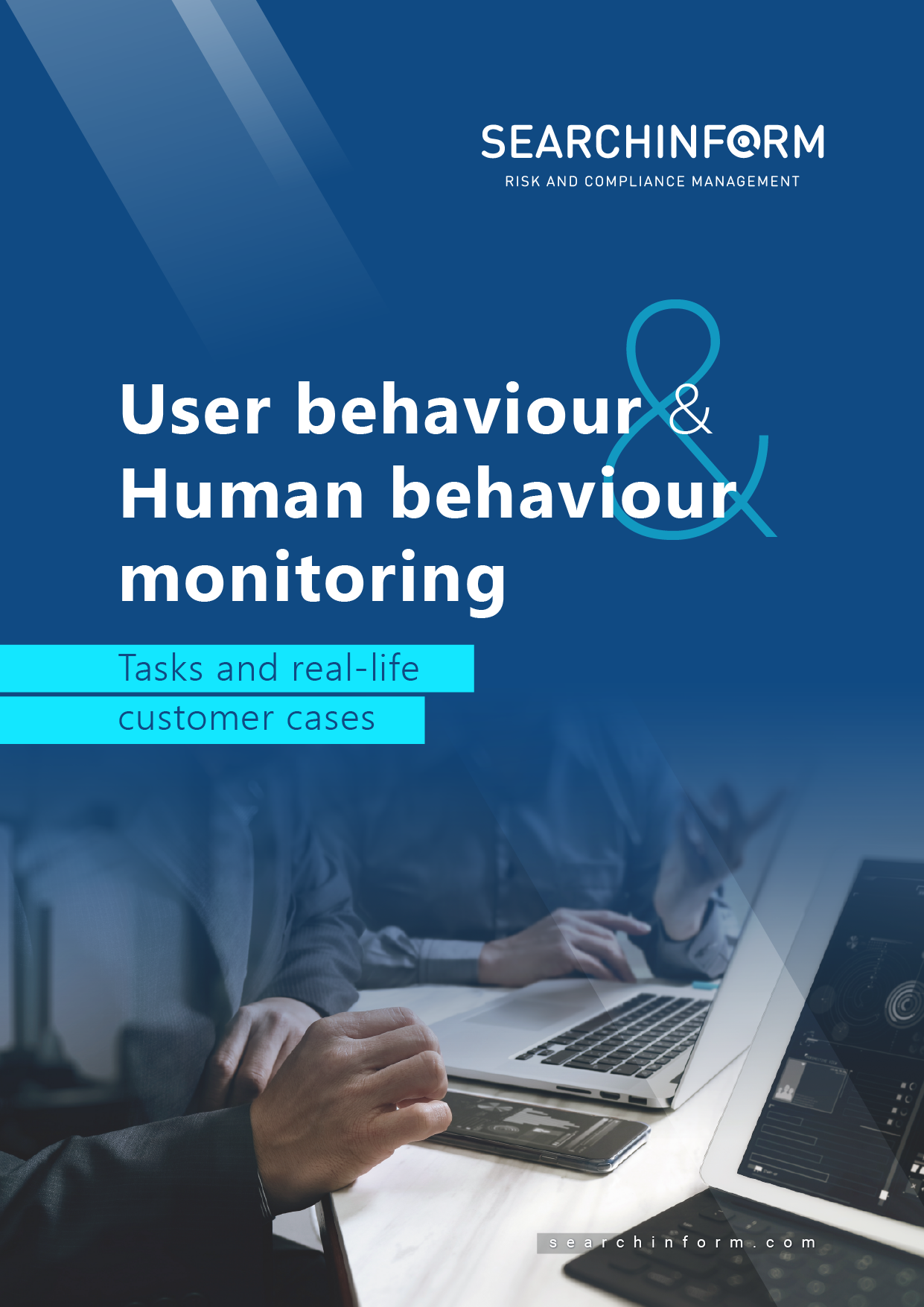Demystifying GLBA Compliance: A Comprehensive Guide
- What is GLBA?
- Key Components of GLBA
- GLBA Compliance Checklist
- Privacy Policy Notice
- Information Security Program
- Pretexting Prevention
- Vendor Management
- Incident Response Plan
- Compliance Oversight
- Recordkeeping
- Regulatory Reporting
- Challenges in Achieving GLBA Compliance
- Advantages of SearchInform Solutions for Achieving GLBA Compliance
What is GLBA?
The Gramm-Leach-Bliley Act (GLBA), also known as the Financial Services Modernization Act of 1999, is a United States federal law that governs how financial institutions handle the personal information of their customers. It was enacted to promote consumer privacy and to regulate how financial institutions share and protect sensitive information.
The importance of GLBA compliance lies in several key aspects:
Consumer Privacy Protection: GLBA requires financial institutions to provide notice to customers about their privacy policies and practices regarding the disclosure of nonpublic personal information. This helps to ensure transparency and gives consumers control over their personal financial data.
Data Security Standards: GLBA mandates that financial institutions implement appropriate safeguards to protect the security and confidentiality of customer information. This includes measures such as encryption, access controls, and regular security assessments to mitigate the risk of unauthorized access or data breaches.
Risk Management: GLBA compliance encourages financial institutions to develop comprehensive risk management programs to identify, assess, and mitigate risks associated with the collection, storage, and transmission of customer information. This helps to safeguard against potential threats and vulnerabilities that could compromise data security.
Regulatory Compliance: Compliance with GLBA is not optional for financial institutions. Failure to comply with GLBA requirements can result in significant penalties, fines, and reputational damage. Therefore, ensuring GLBA compliance is essential for maintaining regulatory compliance and avoiding legal consequences.
Trust and Reputation: By demonstrating compliance with GLBA regulations, financial institutions can enhance trust and confidence among customers and stakeholders. Compliance with privacy and data security standards instills a sense of trust that financial institutions take the protection of customer information seriously, which is crucial for maintaining a positive reputation in the marketplace.
GLBA compliance is essential for safeguarding consumer privacy, maintaining data security, managing risk, meeting regulatory requirements, and preserving trust and confidence in the financial services industry.
Key Components of GLBA
The Gramm-Leach-Bliley Act (GLBA) consists of several key components aimed at regulating the handling of personal financial information by financial institutions. Some of the key components of GLBA include:
Privacy Requirements: GLBA mandates that financial institutions must inform consumers about their privacy policies and practices regarding the collection, use, and sharing of personal financial information. This typically involves providing customers with initial privacy notices when they establish a relationship with the institution, as well as annual notices thereafter. Customers must also be given the opportunity to opt out of having their information shared with non-affiliated third parties.
Safeguards Rule: Under the Safeguards Rule, financial institutions are required to develop, implement, and maintain comprehensive information security programs to protect the confidentiality and integrity of customer information. These security programs must address various aspects of data security, including employee training, access controls, encryption, and risk assessment.
Pretexting Prohibition: GLBA prohibits the practice of pretexting, which involves using false pretenses to obtain personal information from a financial institution. This helps prevent identity theft and unauthorized access to customer data.
Enforcement and Penalties: GLBA grants regulatory authority to several federal agencies, including the Federal Trade Commission (FTC), the Federal Reserve Board, and the Securities and Exchange Commission (SEC), to enforce its provisions. Financial institutions that fail to comply with GLBA requirements may be subject to civil penalties and sanctions.
Exceptions and Exemptions: GLBA provides certain exceptions and exemptions for certain types of financial institutions and specific activities. For example, GLBA exempts certain businesses, such as small businesses and certain types of insurance companies, from certain provisions. Additionally, GLBA includes provisions allowing for information sharing among affiliates of a financial institution under certain circumstances.
Components of GLBA are designed to promote consumer privacy and data security while allowing for the efficient functioning of financial markets. Compliance with GLBA is essential for financial institutions to protect consumer information and avoid regulatory penalties.
GLBA Compliance Checklist
Compliance with the Gramm-Leach-Bliley Act (GLBA) is essential for financial institutions to protect consumer privacy and data security. Understanding this compliance landscape can empower your institution to not only meet regulatory requirements but also enhance customer trust. Here’s a comprehensive checklist designed to ensure GLBA compliance effectively.
Privacy Policy Notice
Providing consumers with clear privacy policy notices is the foundation of GLBA compliance. Financial institutions must deliver initial and annual notifications detailing their privacy practices.
- Clear Communication: These notices should clearly explain how personal information is collected, used, and shared, including any opt-out options available. Imagine receiving a notification from your bank that explains not just what they’re doing with your data, but why—it fosters trust.
- Consumer Engagement: Encourage consumers to read these notices by making them accessible and straightforward. An informed customer is a more trusting customer.
Information Security Program
The backbone of protecting customer information lies in a well-structured information security program.
- Developing the Program: Start by designing a comprehensive strategy that encompasses various aspects of data protection.
- Regular Risk Assessments: Conduct regular assessments to identify potential vulnerabilities in your systems. This proactive approach acts like an annual health check-up for your security measures.
- Establish Security Policies: Implement policies that cover access controls, encryption methods, and secure data disposal techniques. Each employee should be well-informed about their role in maintaining these protocols.
- Ongoing Employee Training: Regular training on data security best practices ensures that employees remain vigilant against potential threats. Remember, human error is often the weakest link in security chains.
Pretexting Prevention
Pretexting poses a significant risk to consumer information security; combatting it requires diligence.
- Identity Verification Measures: Establish strong protocols for verifying the identities of individuals requesting access to customer data.
- Employee Awareness Training: Train employees to recognize suspicious requests and respond appropriately. A culture of vigilance can help safeguard sensitive information.
Vendor Management
In today’s interconnected environment, third-party vendors play essential roles but also introduce risks.
- Monitoring Vendor Security Practices: Regularly assess the security measures employed by vendors who have access to customer information.
- Contractual Safeguards: Ensure all vendor contracts contain clauses specifying their responsibility for safeguarding data and reporting any incidents. A solid partnership includes shared accountability for protecting customer information.
Incident Response Plan
Preparedness is critical when it comes to dealing with potential breaches or unauthorized access incidents.

Key Elements of an Effective Plan:
- Develop procedures for promptly investigating and responding to any security incidents.
- Outline how you will notify affected customers as required by law. Being upfront during crises reinforces trust.
- Include protocols for reporting incidents to regulatory authorities—communication is key during such events.
Compliance Oversight
Assigning a compliance officer or team dedicated to overseeing GLBA compliance efforts ensures focused attention on this critical area.
- Regular Audits and Assessments: Conduct regular evaluations of your institution's privacy and security controls. This not only checks for compliance but also pinpoints areas needing improvement.
- Staying Informed: Keeping abreast of updates related to GLBA regulations will help your institution adapt quickly as requirements evolve.
Recordkeeping
Maintaining thorough documentation of all GLBA compliance efforts is vital for demonstrating adherence to regulations.
Documentation Essentials:
- Privacy notices issued
- Security policies developed
- Employee training records
- Incident response plans
- Audit reports generated
Retain these records according to the specified retention periods outlined by GLBA regulations—a well-documented process can save you from headaches during audits or inquiries.
Regulatory Reporting
Timely reporting to regulatory authorities such as the Federal Trade Commission (FTC) or federal banking agencies is crucial for maintaining compliance under GLBA regulations.
By following this comprehensive checklist, financial institutions can take significant strides toward ensuring adherence to GLBA requirements while actively protecting customer privacy and securing sensitive data. In our ever-evolving digital landscape, regularly reviewing these strategies ensures that institutions are prepared not only for current challenges but also future complexities waiting around the corner—all while building lasting relationships based on trust with their clients.
Challenges in Achieving GLBA Compliance
Achieving compliance with the Gramm-Leach-Bliley Act (GLBA) can present several challenges for financial institutions and organizations handling sensitive consumer financial information. Some of these challenges include:
Complex Regulatory Requirements: GLBA compliance involves navigating a complex regulatory landscape with numerous requirements, including privacy notices, information security programs, and incident response plans. Understanding and interpreting these requirements can be challenging, particularly for organizations with limited legal or regulatory expertise.
Resource Constraints: Implementing and maintaining GLBA compliance measures requires significant financial and human resources. Small to mid-sized financial institutions may struggle to allocate adequate resources for compliance efforts, including staff training, technology investments, and ongoing monitoring and auditing.
Rapid Technological Advancements: The evolving nature of technology presents challenges for maintaining data security and adapting to new cybersecurity threats. Financial institutions must continuously update their systems and processes to address emerging risks, such as ransomware attacks, phishing scams, and data breaches.
Vendor Management: Financial institutions often rely on third-party vendors and service providers to support their operations. However, managing vendor compliance with GLBA requirements can be challenging, as it involves assessing and monitoring the security practices of multiple vendors and ensuring contractual compliance with data protection standards.
Employee Training and Awareness: Human error remains a significant risk factor in data breaches and security incidents. Ensuring that employees receive comprehensive training on data security best practices and GLBA compliance requirements is essential for mitigating risks and promoting a culture of security awareness within the organization.
Data Fragmentation and Integration: Financial institutions may face challenges in consolidating and integrating data from disparate systems and platforms while ensuring compliance with GLBA requirements. Fragmented data environments can increase the risk of data breaches and complicate efforts to maintain data security and privacy.
Changing Regulatory Landscape: The regulatory environment surrounding data privacy and cybersecurity is continually evolving, with new laws, regulations, and industry standards being introduced regularly. Staying abreast of these changes and ensuring ongoing compliance with GLBA and other relevant regulations can be a daunting task for organizations.
Balancing Security and Customer Experience: Implementing stringent security measures to protect customer information may sometimes conflict with efforts to deliver a seamless and user-friendly customer experience. Financial institutions must strike a balance between enhancing security and maintaining customer satisfaction and trust.
Addressing these challenges requires a proactive and comprehensive approach to GLBA compliance, including robust risk management strategies, ongoing staff training, investment in technology and infrastructure, and regular assessments and audits to ensure compliance with regulatory requirements.
Advantages of SearchInform Solutions for Achieving GLBA Compliance
SearchInform offers a range of solutions for data security, compliance, and risk management, including tools that can assist organizations in achieving GLBA compliance. Here are some benefits of using SearchInform solutions for GLBA compliance:
Data Discovery and Classification: SearchInform solutions can help organizations discover and classify sensitive financial information across their networks and systems. By identifying where sensitive data resides and categorizing it according to GLBA requirements, organizations can better protect customer information and ensure compliance with data handling regulations.
Data Loss Prevention (DLP): SearchInform's DLP capabilities can help prevent unauthorized access, disclosure, or theft of sensitive financial data. By monitoring and controlling data flows within the organization, including email, file transfers, and other communication channels, organizations can reduce the risk of data leakages and non-compliance with GLBA requirements.
User Activity Monitoring: SearchInform solutions offer features for monitoring user activity and detecting suspicious behavior that may indicate unauthorized access to sensitive data. By monitoring user actions, organizations can identify potential insider threats or security incidents and take proactive measures to mitigate risks and maintain compliance with GLBA regulations.
Policy Enforcement: SearchInform solutions enable organizations to enforce security policies and access controls to ensure compliance with GLBA requirements. By defining and enforcing policies for data access, sharing, and usage, organizations can reduce the risk of data leakages and ensure that only authorized users have access to sensitive financial information.
Incident Response and Investigation: In the event of a security incident or data leak, SearchInform solutions provide capabilities for incident response and investigation. Organizations can use these tools to quickly identify the cause of the incident, assess the impact on sensitive data, and take appropriate remediation actions to prevent similar incidents in the future and demonstrate compliance with GLBA reporting requirements.
Audit and Reporting: SearchInform solutions offer capabilities for auditing user activity, data access, and security controls to ensure compliance with GLBA requirements. Organizations can generate comprehensive reports on compliance status, security incidents, and audit findings to demonstrate adherence to GLBA regulations and facilitate regulatory audits and assessments.
Leveraging SearchInform solutions can help organizations enhance their data security posture, mitigate compliance risks, and achieve GLBA compliance by providing comprehensive capabilities for data discovery, DLP, user activity monitoring, policy enforcement, incident response, and audit and reporting.
Explore the advantages of SearchInform solutions today to streamline your path to GLBA compliance and safeguard your organization's sensitive financial data!
Extend the range of addressed challenges with minimum effort
Company news
SearchInform uses four types of cookies as described below. You can decide which categories of cookies you wish to accept to improve your experience on our website. To learn more about the cookies we use on our site, please read our Cookie Policy.
Necessary Cookies
Always active. These cookies are essential to our website working effectively.
Cookies does not collect personal information. You can disable the cookie files
record
on the Internet Settings tab in your browser.
Functional Cookies
These cookies allow SearchInform to provide enhanced functionality and personalization, such as remembering the language you choose to interact with the website.
Performance Cookies
These cookies enable SearchInform to understand what information is the most valuable to you, so we can improve our services and website.
Third-party Cookies
These cookies are created by other resources to allow our website to embed content from other websites, for example, images, ads, and text.
Please enable Functional Cookies
You have disabled the Functional Cookies.
To complete the form and get in touch with us, you need to enable Functional Cookies.
Otherwise the form cannot be sent to us.

Subscribe to our newsletter and receive a bright and useful tutorial Explaining Information Security in 4 steps!

Subscribe to our newsletter and receive case studies in comics!







